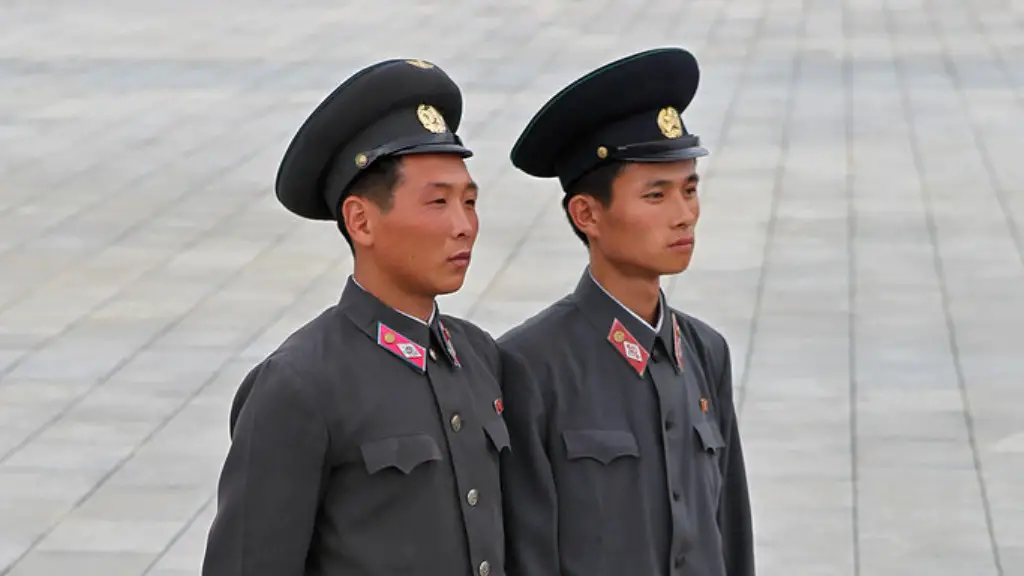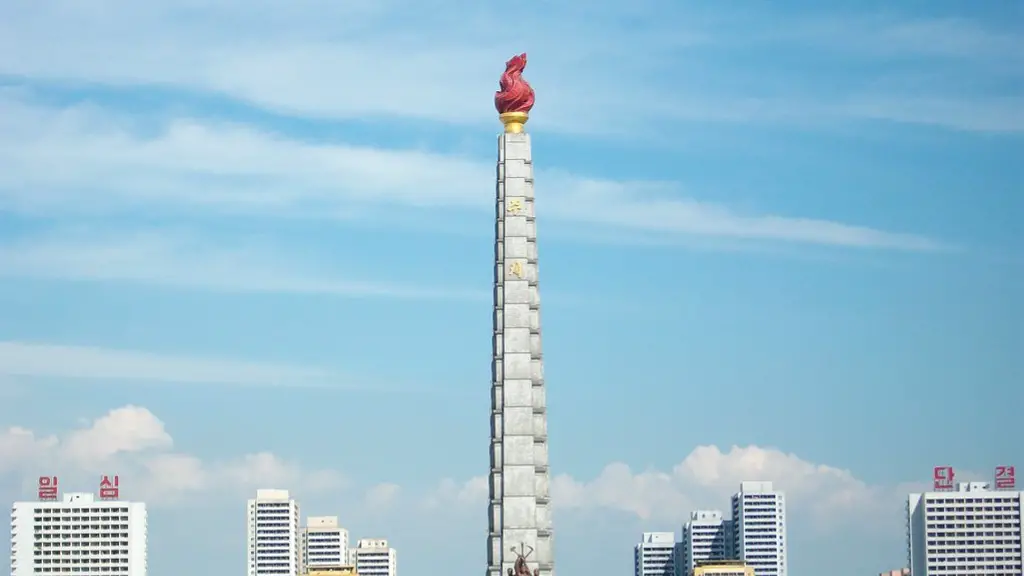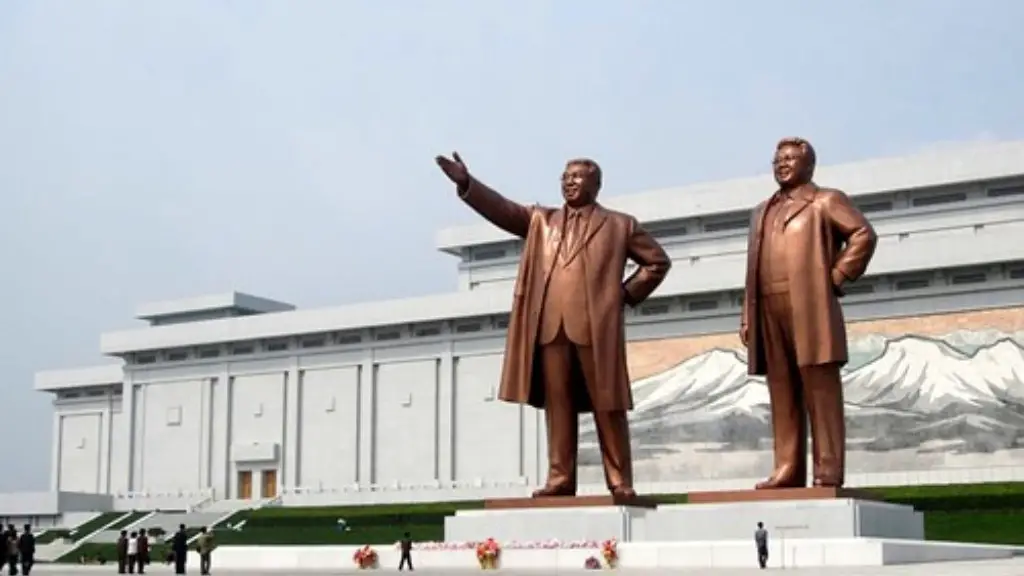Political Differences
After World War II, the Allied powers – Britain, the US and the Soviet Union – division of the Korean peninsula into two parts; North Korea and South Korea. This division of the two countries was due to the political differences between North Korea and South Korea. North Korea was a communist state while South Korea was largely democratic. The Soviet Union occupied North Korea while the US occupied South Korea. The two countries were divided permanently in 1945 by the 38th parallel with North Korea being occupied by the Soviet Union and South Korea being occupied by the US.
The political and ideological differences between North Korea and South Korea were further highlighted when the Korean War began in 1950. North Korea, which was supported financially by the Soviet Union, was opposed to the South Korean government and wished to reunify Korea under its own government. South Korea, which was supported by the UN and the US, was opposed to reunification on North Korean terms.
Economic And Social Differences
The economic and social differences between North Korea and South Korea have continued to widen in recent years. Since the Korean War, North Korea has remained an impoverished and isolated country with one of the most closed economies in the world. South Korea, on the other hand, has become a thriving and prosperous economy, with one of the highest GDP per capita income levels in the world. North Korea remains reliant on Russian and Chinese aid while South Korea is a key player in the global economy thanks to its vibrant manufacturing and technology sectors.
The two countries also have distinct social systems. North Korea is a tightly controlled dictatorship with a great deal of censorship and restrictions on everyday life while South Korea is a more open and democratic society. These social differences have contributed to the continual separation of the two countries.
Geographic And Cultural Differences
In addition to the political, economic, and social differences between North Korea and South Korea, there are also differences in geography and culture. North Korea is located in the northeast part of the Korean peninsula and has a population of roughly 25 million people. South Korea is located in the southwest part of the peninsula and has a population of nearly 50 million people.
The two countries also have distinct cultural identities. North Korea has traditionally maintained its independence from outside influences while South Korea has been more open to foreign cultures, resulting in a mixture of traditional and modern elements in its culture. This also contributes to the separation of the two countries.
Societal Polarization
The division of North Korea and South Korea has resulted in a divide between Koreans living on both sides of the border. Over the years, the two sides have become increasingly polarized as they identify themselves with different political systems and ideologies. North Koreans are more likely to identify with North Korean government while South Koreans are more likely to identify with the South Korean government. This deepening divide between the two sides has resulted in a lack of meaningful contacts between North and South Koreans in recent years.
Media Influence
The media has also played a role in maintaining the separation between North and South Korea. North Korea has notoriously tightly controlled its media and has used it to shape public opinion. The North Korean government has spread propaganda about South Korea and its government, portraying it as imperialist and hostile. Meanwhile, South Korean media has portrayed North Korea as oppressive and dangerous, reinforcing the divide between the two countries.
International Relationships
The different international relationships between North Korea and South Korea have also contributed to the separation between the two countries. North Korea has traditionally positioned itself as a resistant state and maintained friendly relations with countries such as Russia and China, while South Korea has been more open to international relationships and has developed close ties with countries such as the US and Japan. These different international relationships also contribute to the separation between the two countries.
Political Policy Decisions
Finally, the political policy decisions of North Korea and South Korea have further contributed to the separation between the two countries. North Korea has traditionally remained a closed and authoritarian state while South Korea has been more open and democratic. This difference in political systems has further reinforced the divide between the two countries.
US Influence
The US has played a key role in the separation between North and South Korea. The US has provided economic and military aid to South Korea and has intervened in North Korean affairs in an effort to stop its nuclear weapons program. The US has also maintained a strong military presence in the region, which North Korea views as a threat to its independence and sovereignty. This has further reinforced the tensions between the two countries.
Negotiations
Over the years, negotiations between North and South Korea have been undertaken to try to reunite the two countries. Two rounds of talks were held in the early 1990s and a historic summit between the two leaders of the two countries was held in 2000. Despite the initial progress that was made, subsequent talks failed to make progress towards reunification.
Ground Relationships
Despite the political divisions, there have been some positive developments in ground relationships between North and South Korea. There have been a number of projects that have brought North and South Koreans together, such as joint economic enterprises and reunions for families divided by the war. These projects have facilitated dialogue and understanding between the two sides and have improved the relationships on the ground.
Economic Aid
The economic aid provided by South Korea to North Korea has also been a factor in the separation between the two countries. South Korea has provided massive amounts of aid to North Korea since the early 2000s. This aid has been met with ambivalence in North Korea as the government is reluctant to become overly dependent on South Korea. This has made it difficult to make any progress towards reunification.
Propaganda
North Korea has continued to spread propaganda and anti-South Korean sentiment. This propaganda typically portrays the South Korean government as a puppet of the US and is designed to discourage North Koreans from engaging with South Korea. This propaganda has been a significant factor in maintaining the divide between the two countries.
Military Force
The military force maintained by North Korea has also been a factor in the separation between the two countries. North Korea maintains a large and powerful military force, which South Korea views as a threat to its security. This has resulted in tensions between the two countries, making it difficult to make progress towards reunification.
Military Drills
The military drills conducted by both North and South Korea have further contributed to tensions between the two countries. Both North and South Korea routinely conduct military drills in an attempt to show their militaries’ strength. These drills often increase tensions between the two sides and make it difficult to make any progress towards reunification.
Regional Politics
Regional politics has also contributed to the separation of North and South Korea. The two countries are located in a region where tensions between the US and China remain high. This has made it difficult for North and South Korea to cooperate and make progress towards reunification.
International Pressure
The international pressure from the US and other countries have also played a role in maintaining the separation between North and South Korea. The US and other countries have criticized North Korea for its nuclear weapons program and have imposed sanctions on the country. This has led to economic hardship for North Koreans and has made it difficult for North Korea to make progress towards reunification.



